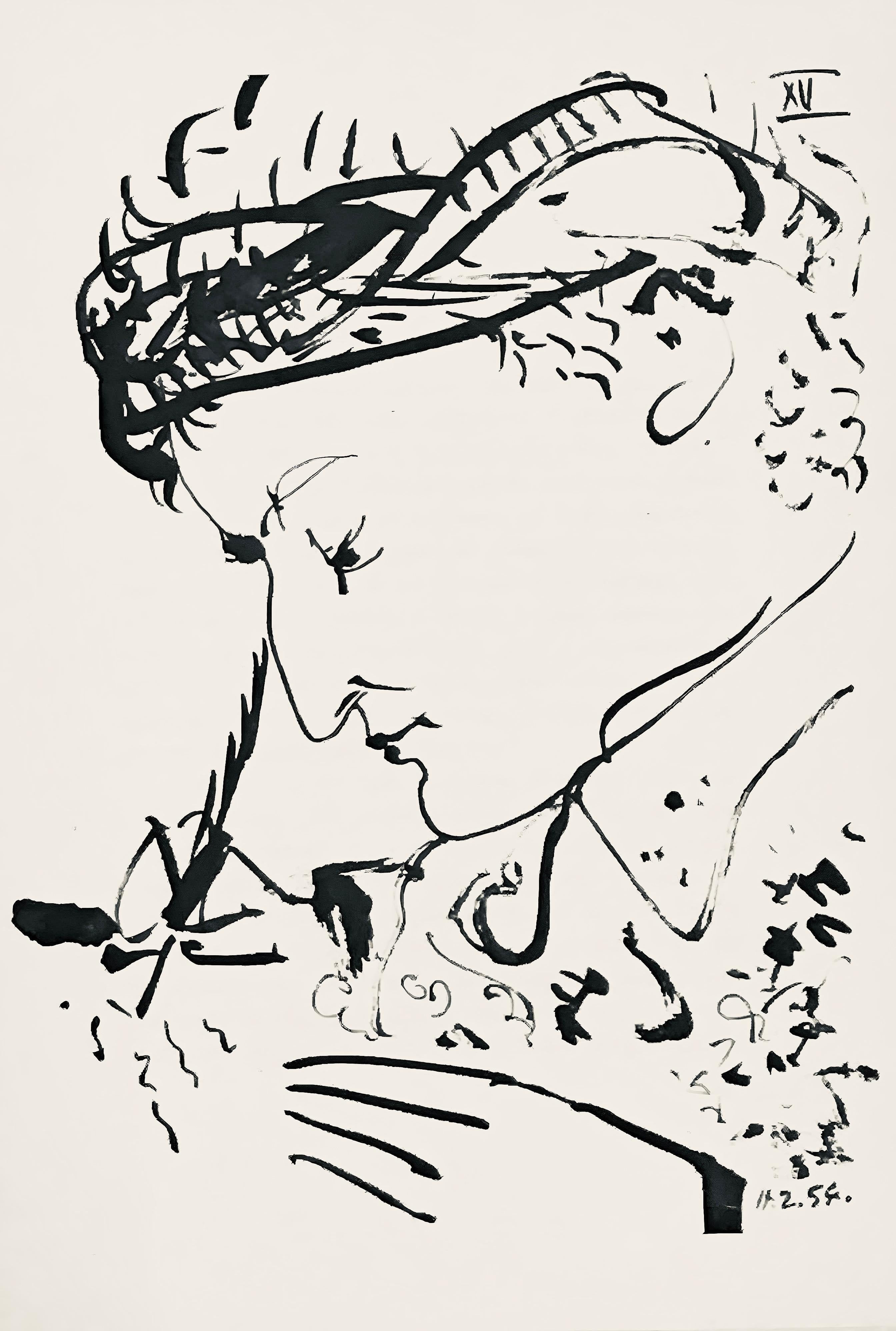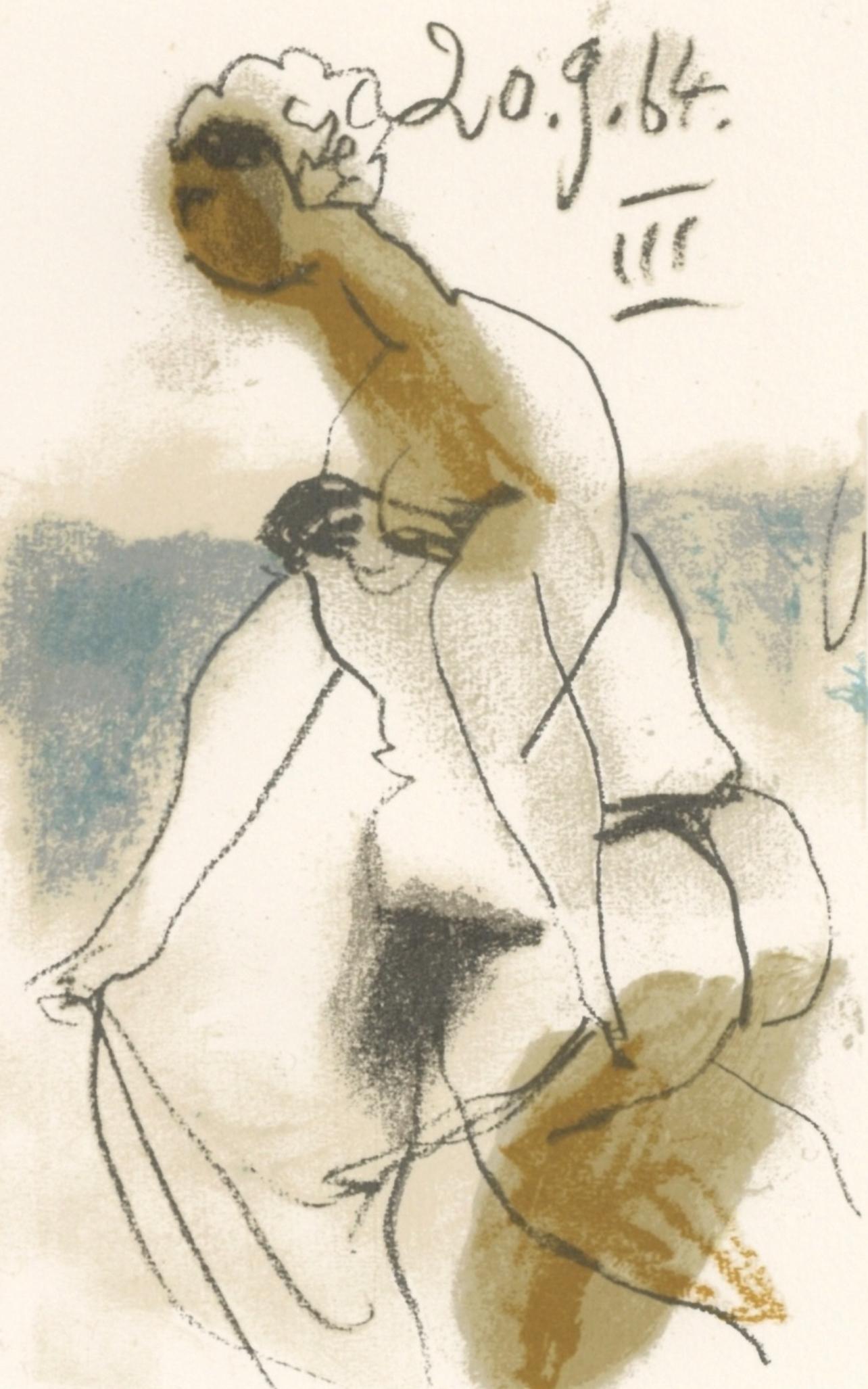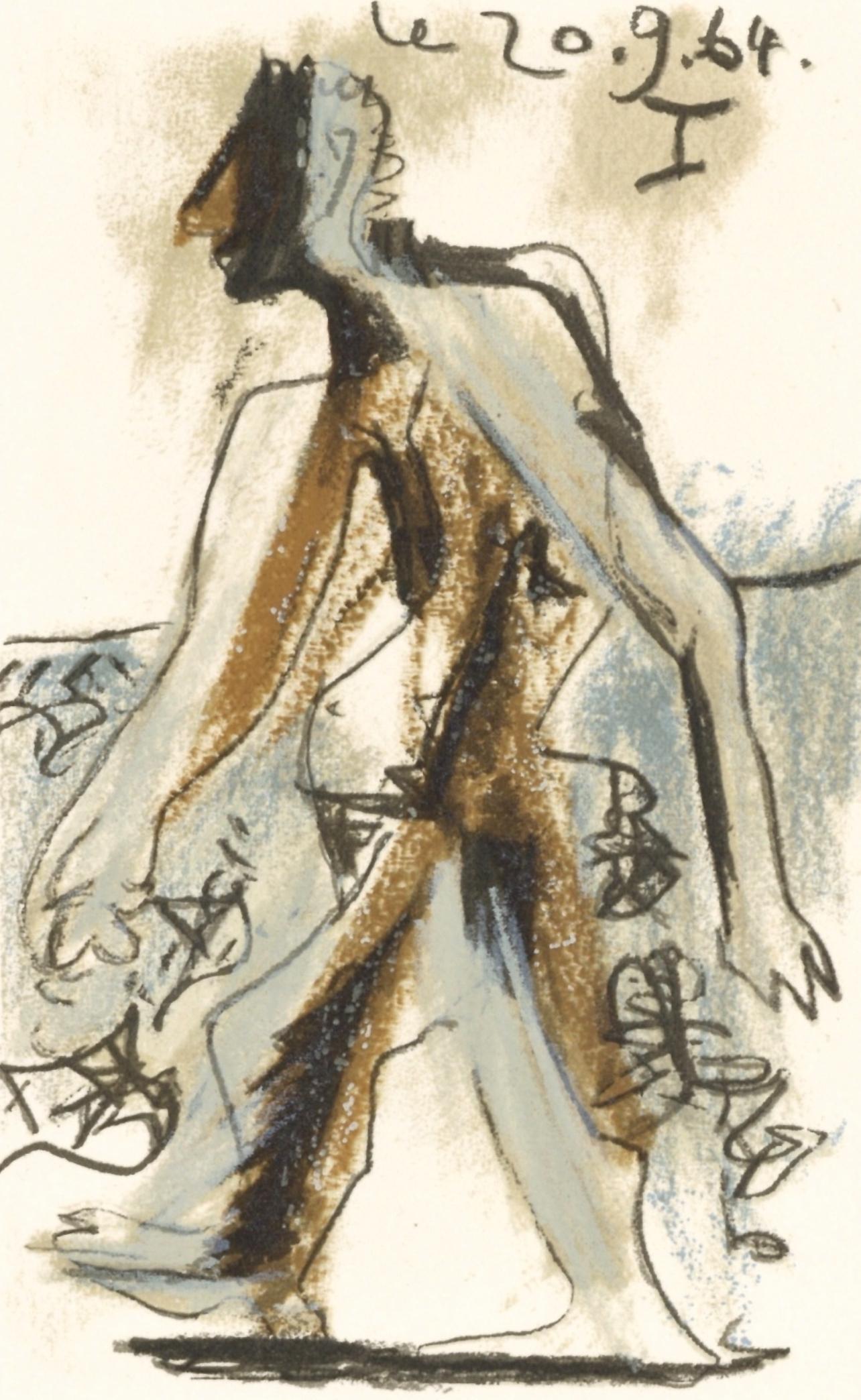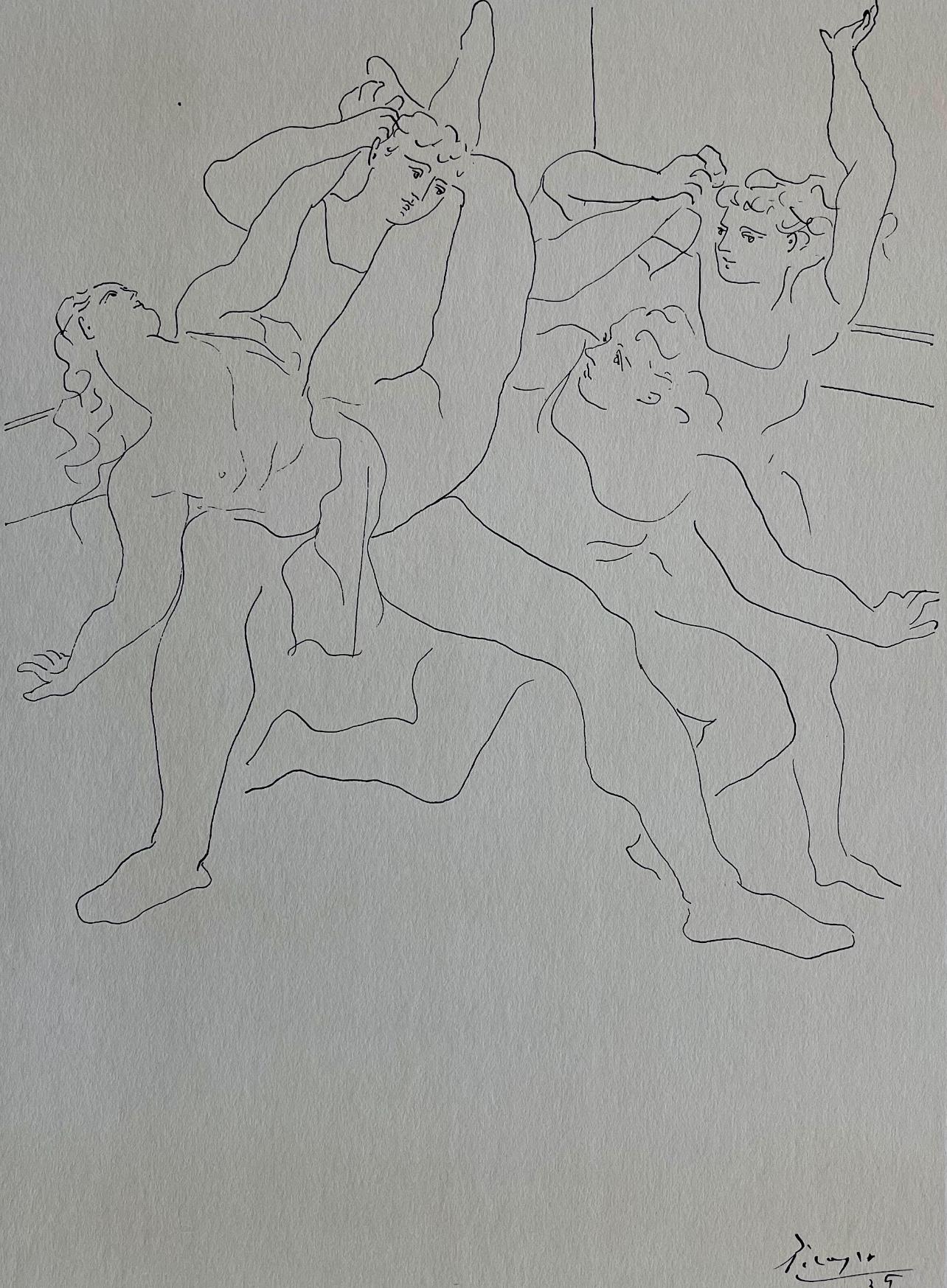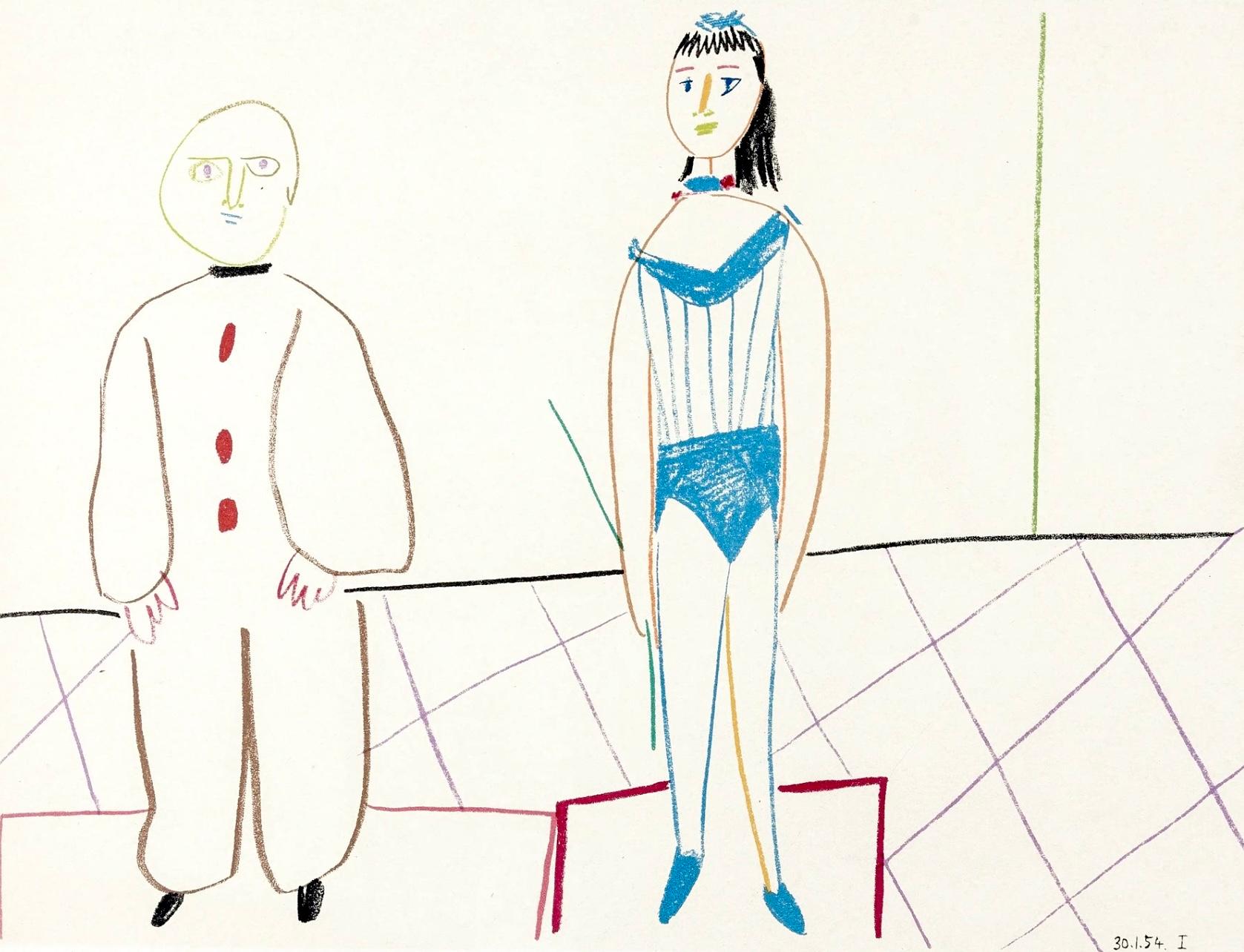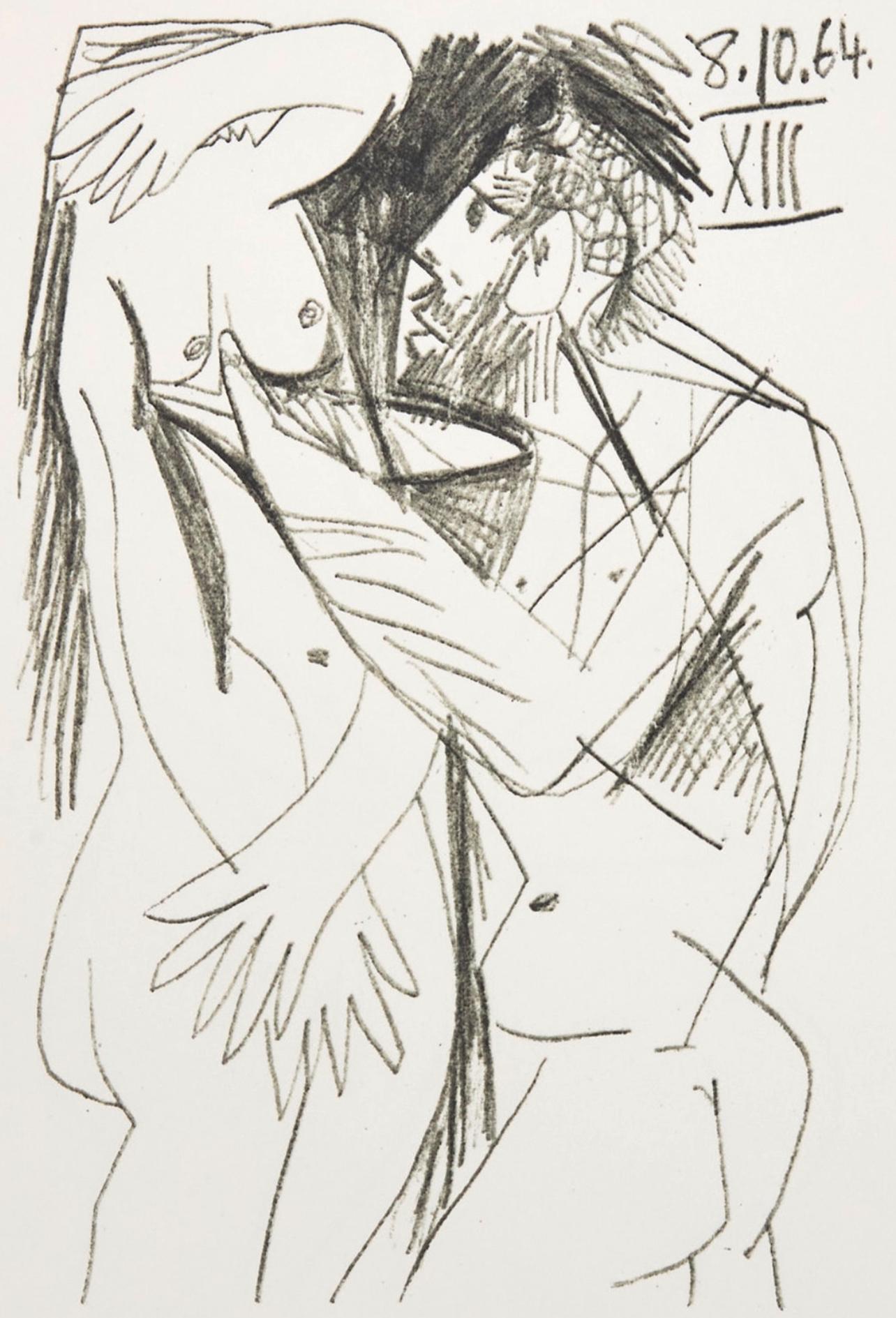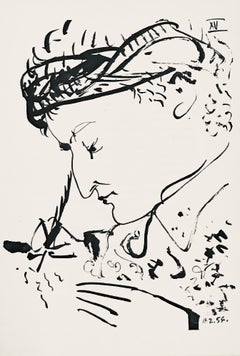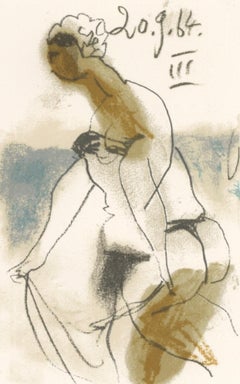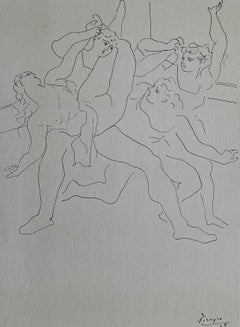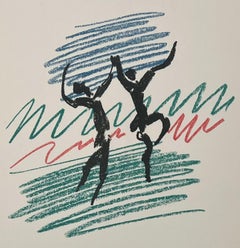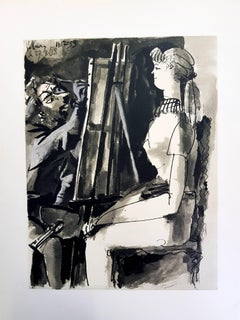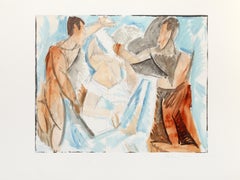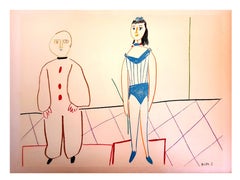Items Similar to Pablo Picasso, Two Dancers, from Sources of the Wind, 1934 (after)
Want more images or videos?
Request additional images or videos from the seller
1 of 9
Pablo Picasso, Two Dancers, from Sources of the Wind, 1934 (after)1934
1934
$716
$89520% Off
£556.50
£695.6220% Off
€634.54
€793.1720% Off
CA$1,027.28
CA$1,284.1020% Off
A$1,118.22
A$1,397.7720% Off
CHF 591.15
CHF 738.9420% Off
MX$13,520.58
MX$16,900.7220% Off
NOK 7,410.71
NOK 9,263.3820% Off
SEK 6,936.41
SEK 8,670.5120% Off
DKK 4,737.18
DKK 5,921.4720% Off
About the Item
This exquisite lithograph after Pablo Picasso (1881–1973), titled Deux danseurs (Two Dancers), from the album Sources du vent 1915–1929, avec un portrait par Picasso (Sources of the Wind 1915–1929, with a Portrait by Picasso), originates from the 1934 edition published by Serge Lifar, Destin d’un danseur, Paris, and printed by Ateliers Helpe, Paris, August 6, 1934. Deux danseurs (Two Dancers) reflects Picassos fascination with rhythm, movement, and the human form, themes that resonated deeply with Serge Lifar—the legendary Ballets Russes dancer and choreographer. This lithograph captures the grace and dynamism of dance through interlocking, simplified forms that express motion and harmony with a sense of lyrical abstraction. Created at the height of Picassos collaboration with the worlds of music, theater, and dance, the work exemplifies his mastery of translating bodily rhythm into visual poetry.
Executed as a lithograph on velin Saint-Vincent-de-Blanzat des Papeteries Navarre paper, this work measures 11.22 x 9.06 inches. Signed in the plate and unnumbered as issued. The edition exemplifies the fine craftsmanship of Ateliers Helpe, Paris, under the direction of Serge Lifar.
Artwork Details:
Artist: After Pablo Picasso (1881–1973)
Title: Deux danseurs (Two Dancers), from the album Sources du vent 1915–1929, avec un portrait par Picasso (Sources of the Wind 1915–1929, with a Portrait by Picasso), 1934
Medium: Lithograph on velin Saint-Vincent-de-Blanzat des Papeteries Navarre paper
Dimensions: 11.22 x 9.06 inches (28.5 x 23 cm)
Inscription: Signed in the plate and unnumbered as issued
Date: 1934
Publisher: Serge Lifar, Destin d’un danseur, Paris
Printer: Ateliers Helpe, Paris
Catalogue Raisonne Reference:
Horodisch, Abraham. Pablo Picasso: The Illustrated Books. Catalogue Raisonne. Amsterdam: Hertzberger & Co., 1956, illustration D10.
Condition: Well preserved, consistent with age and medium
Provenance: From the album Sources du vent 1915–1929, published by Serge Lifar, Destin d’un danseur, Paris, and printed by Ateliers Helpe, Paris, August 6, 1934
Notes:
Excerpted from the album (translated from French): This volume, published in the in-4° square format, was completed and printed on behalf of Editions Bernard Grasset, on August 6, 1934, by it has been drawn from this album, LXXX examples on velin d'Arches, numbered from I a LXX, and H.C. I to H.C. X. In addition, MDCCCL examples on Velin Saint-Vincent-de-Blanzat des Papeteries Navarre, numbered I to MDCL; and press examples, I to CC in Mayenne (France). The boards were drawn in phototype by les Ateliers Helpe, 22, Rue Legendre, in Paris.
About the Publication:
Sources du vent 1915–1929, avec un portrait par Picasso (Sources of the Wind 1915–1929, with a Portrait by Picasso), published in 1934 by Serge Lifar, marks a key collaboration between literature, dance, and visual art in interwar France. Conceived as a tribute to the spirit of artistic renewal that followed World War I, the album reflects the synthesis of movement, poetry, and design that characterized Lifar’s career as both dancer and choreographer. The volume was printed at the distinguished Ateliers Helpe, known for their mastery in phototype and fine lithographic processes, and issued under the supervision of Editions Bernard Grasset in Paris. Produced in a carefully structured edition on luxurious paper stocks—including rare proofs on velin d’Arches and Japon—the album unites visual and poetic elements into a single expression of rhythm and grace. Picasso’s contribution, Deux danseurs, embodies the collaboration between visual art and performance, translating the vitality of dance into elegant, fluid form. The project stands as one of the most sophisticated examples of the artist-book tradition of the 1930s, capturing the synergy between the visual and performing arts that defined Parisian modernism.
About the Artist:
Pablo Picasso (1881–1973) was a Spanish painter, sculptor, printmaker, and ceramicist whose extraordinary vision revolutionized modern art and defined the visual language of the 20th century. A child prodigy from Malaga, Spain, Picassos career spanned more than seven decades and encompassed an astonishing range of styles and innovations—from the melancholic Blue and romantic Rose periods to his pioneering invention of Cubism with Georges Braque, which shattered conventional notions of perspective and form. Influenced by the bold expressiveness of El Greco, the structure of Cezanne, and the vitality of African and Iberian sculpture, Picasso became a central figure of the Paris avant-garde, working in creative dialogue with contemporaries such as Henri Matisse, Alexander Calder, Alberto Giacometti, Salvador Dali, Joan Miro, Wassily Kandinsky, Marcel Duchamp, and Man Ray. His insatiable experimentation extended across painting, drawing, printmaking, ceramics, and sculpture, forever expanding the boundaries of artistic expression. A master of reinvention, Picasso profoundly shaped generations of artists who followed—from Andy Warhol, Roy Lichtenstein, David Hockney, and Jean-Michel Basquiat to Jeff Koons and Banksy—cementing his status as a timeless cultural icon whose works remain among the most sought after worldwide. His landmark painting Les Femmes d'Alger (Version O) achieved a record-breaking sale of 179,365,000 USD at Christies, New York, on May 11, 2015, affirming Picassos enduring legacy as one of the most influential and valuable artists in history.
Pablo Picasso Deux danseurs, Picasso Sources du vent, Picasso Serge Lifar, Picasso Ateliers Helpe, Picasso 1934 lithograph, Picasso Navarre paper.
- Creation Year:1934
- Dimensions:Height: 11.22 in (28.5 cm)Width: 9.055 in (23 cm)
- Medium:
- Movement & Style:
- After:Pablo Picasso (1881-1973, Spanish)
- Period:
- Condition:
- Gallery Location:Southampton, NY
- Reference Number:1stDibs: LU1465215466982
About the Seller
4.9
Platinum Seller
Premium sellers with a 4.7+ rating and 24-hour response times
Established in 1978
1stDibs seller since 2021
1,213 sales on 1stDibs
Typical response time: <1 hour
- ShippingRetrieving quote...Shipping from: Southampton, NY
- Return Policy
Authenticity Guarantee
In the unlikely event there’s an issue with an item’s authenticity, contact us within 1 year for a full refund. DetailsMoney-Back Guarantee
If your item is not as described, is damaged in transit, or does not arrive, contact us within 7 days for a full refund. Details24-Hour Cancellation
You have a 24-hour grace period in which to reconsider your purchase, with no questions asked.Vetted Professional Sellers
Our world-class sellers must adhere to strict standards for service and quality, maintaining the integrity of our listings.Price-Match Guarantee
If you find that a seller listed the same item for a lower price elsewhere, we’ll match it.Trusted Global Delivery
Our best-in-class carrier network provides specialized shipping options worldwide, including custom delivery.More From This Seller
View AllPablo Picasso, Head of a Woman XV, from Mystification, 1954 (after)
By Pablo Picasso
Located in Southampton, NY
This exquisite lithograph after Pablo Picasso (1881–1973), titled Tete de femme XV (Head of a Woman XV), from the album Mystification ou l'Histoire des portraits (Mystification or Th...
Category
1950s Modern Figurative Prints
Materials
Lithograph
$1,996 Sale Price
20% Off
Free Shipping
Pablo Picasso, 20.0.64. III, from The Taste of Happiness, 1970 (after)
By Pablo Picasso
Located in Southampton, NY
This exquisite lithograph after Pablo Picasso (1881–1973), titled 20.9.64. III, from the folio Le Gout du Bonheur, trois carnets d`atelier (The Taste of Happiness, Three Studio Sketc...
Category
1970s Cubist Figurative Prints
Materials
Lithograph
$796 Sale Price
20% Off
Free Shipping
Pablo Picasso, 20.9.64. I, from The Taste of Happiness, 1970 (after)
By Pablo Picasso
Located in Southampton, NY
This exquisite lithograph after Pablo Picasso (1881–1973), titled 20.9.64. I, from the folio Le Gout du Bonheur, trois carnets d`atelier (The Taste of Happiness, Three Studio Sketchb...
Category
1970s Cubist Figurative Prints
Materials
Lithograph
$796 Sale Price
20% Off
Free Shipping
Pablo Picasso, Four Ballet Dancers, from Fifteen Drawings, 1946 (after)
By Pablo Picasso
Located in Southampton, NY
This exquisite lithograph and pochoir after Pablo Picasso (1881–1973), titled Four Ballet Dancers, from the folio Picasso, Fifteen Drawings, 1946, originates from the 1946 edition published by Pantheon Books, Inc., New York, and rendered and printed by Albert Carman, City Island...
Category
1940s Modern Abstract Prints
Materials
Lithograph, Stencil
$3,996 Sale Price
20% Off
Free Shipping
Pablo Picasso, Harlequin and Female Acrobat, from The Human Comedy, 1954 (after)
By Pablo Picasso
Located in Southampton, NY
This exquisite lithograph after Pablo Picasso (1881–1973), titled Arlequin et Femme Acrobate (Harlequin and Female Acrobat), from Verve, Revue Artistique et Litteraire, La Comedie Humaine (The Human Comedy), Vol. VIII, No. 29–30, originates from the 1954 issue published by Editions de la revue Verve, Paris, under the direction of Teriade, Editeur, Paris, and printed by Mourlot Freres, Paris, 1954. This expressive and evocative composition captures Picasso’s enduring fascination with the circus and the human condition, recurring themes throughout his long career. Arlequin et Femme Acrobate reflects the artist’s profound empathy for the performers of his imagination—figures of strength, fragility, and grace that embody the drama and poetry of life itself. Executed during his Vallauris period, this work radiates vitality and emotional tension, merging his signature economy of line with masterful balance and movement.
Executed as a lithograph on velin du Marais paper, this work measures 10.5 x 14 inches. Unsigned and unnumbered as issued. The edition exemplifies the superb craftsmanship of the Mourlot Freres atelier, renowned for its collaborations with Picasso and other leading modernists of the 20th century.
Artwork Details:
Artist: After Pablo Picasso (1881–1973)
Title: Arlequin et Femme Acrobate (Harlequin and Female Acrobat), from Verve, Revue Artistique et Litteraire, La Comedie Humaine (The Human Comedy), Vol. VIII, No. 29–30, 1954
Medium: Lithograph on velin du Marais paper
Dimensions: 10.5 x 14 inches
Inscription: Unsigned and unnumbered as issued
Date: 1954
Publisher: Editions de la revue Verve, Paris, under the direction of Teriade, Editeur, Paris
Printer: Mourlot Freres, Paris
Condition: Well preserved, consistent with age and medium
Provenance: From Verve, Revue Artistique et Litteraire, La Comedie Humaine (The Human Comedy), Vol. VIII, No. 29–30, published by Editions de la revue Verve, Paris, 1954
Notes:
Excerpted from the album (translated from French), This double issue of Verve, dedicated to Picasso, whose cover was specially composed by the artist, was completed to print on September 15, 1954 by the maitres imprimeurs, Drager freres for the heliogravures, and Mourlot freres for the color lithographs. Excerpted from the publisher (translated from French), Last winter, from mid-December to the end of January 1954, Picasso was working indefatigably on this series of drawings, which rank among the finest, boldest, most poignantly human of all he has produced in the course of his long and brilliant career... Almost one could fancy that in his lonely nights at Vallauris these denizens of a world invented by himself crowded into the artist's room, sat for him, confessed unblushingly their most shameful secrets... We have published the series of drawings in its entirety. They form an organic whole, born of a surging uprush of the creative spirit, and to have omitted any of its elements would have been a mutilation. Nevertheless, when we isolate any one of these elements and fix our attention on a single page, we find the fragment almost as eye-filling as the ensemble. All the drawings are printed in the exact size of the originals and in the chronological order of their making.
About the Publication:
La Comedie Humaine (The Human Comedy), Vol. VIII, No. 29–30 (1954), stands as one of the most significant Verve issues dedicated entirely to Pablo Picasso’s prolific creativity during his Vallauris years. Conceived and directed by Teriade, this double volume presents an extraordinary series of Picasso’s drawings executed between December 1953 and January 1954, printed in their full sequence and original scale. The collection represents a deeply human and poetic vision—an unfiltered exploration of comedy, tragedy, and the theatre of life. Printed by the master atelier Mourlot Freres for the color lithographs, this issue exemplifies Verve’s tradition of pairing literary sophistication with visual innovation. It stands as a testament to Picasso’s restless genius and Teriade’s enduring commitment to producing artistically and historically important publications that bridge art, literature, and modern printing craftsmanship.
About the Artist:
Pablo Picasso (1881–1973) was a Spanish painter, sculptor, printmaker, and ceramicist whose extraordinary vision revolutionized modern art and defined the visual language of the 20th century. A child prodigy from Malaga, Spain, Picasso’s career spanned more than seven decades and encompassed an astonishing range of styles and innovations—from the melancholic Blue and romantic Rose periods to his pioneering invention of Cubism with Georges Braque, which shattered conventional notions of perspective and form. Influenced by the bold expressiveness of El Greco, the structure of Cezanne, and the vitality of African and Iberian sculpture, Picasso became a central figure of the Paris avant-garde, working in creative dialogue with contemporaries such as Henri Matisse, Alexander Calder, Alberto Giacometti, Salvador Dali, Joan Miro, Wassily Kandinsky, Marcel Duchamp, and Man Ray. His insatiable experimentation extended across painting, drawing, printmaking, ceramics, and sculpture, forever expanding the boundaries of artistic expression. A master of reinvention, Picasso profoundly shaped generations of artists who followed—from Andy Warhol, Roy Lichtenstein, David Hockney, and Jean-Michel Basquiat to Jeff Koons and Banksy—cementing his status as a timeless cultural icon whose works remain among the most sought after worldwide. His landmark painting Les Femmes d’Alger (Version “O”) achieved a record-breaking sale of $179,365,000 at Christie’s, New York, on May 11, 2015, affirming Picasso’s enduring legacy as one of the most influential and valuable artists in history.
After Pablo Picasso Arlequin et Femme Acrobate, Picasso Verve...
Category
1950s Cubist Abstract Prints
Materials
Lithograph
$956 Sale Price
20% Off
Free Shipping
Pablo Picasso, 8.10.64. XIII, from The Taste of Happiness, 1970 (after)
By Pablo Picasso
Located in Southampton, NY
This exquisite lithograph after Pablo Picasso (1881–1973), titled 8.10.64. XIII, from the folio Le Gout du Bonheur, trois carnets d`atelier (The Taste of Happiness, Three Studio Sket...
Category
1970s Cubist Figurative Prints
Materials
Lithograph
$796 Sale Price
20% Off
Free Shipping
You May Also Like
La Danse, frontispiece from Picasso Lithographe III
By Pablo Picasso
Located in Washington, DC
Artist: Pablo Picasso
Title: La Danse (frontispiece)
Portfolio: Picasso Lithographe III
Medium: Transfer lithograph printed in colors
Date: 1956
Edition: 3000
Frame Size: 19 1/2" x 1...
Category
1950s Modern Abstract Prints
Materials
Lithograph
The Human Comedy - Lithograph
By (after) Pablo Picasso
Located in Collonge Bellerive, Geneve, CH
After Pablo Picasso
The Human Comedy - Lithograph after an original drawing, as published in the journal "Verve"
Printed signature and date
Dimensi...
Category
1950s Modern Figurative Prints
Materials
Lithograph
Etude de Personnages, Cubist Lithograph after Pablo Picasso
By Pablo Picasso
Located in Long Island City, NY
Intertwined throughout the composition, several figures rendered in hues of orange raise their arms and move about against a blue composition. Featuring the same color scheme and ang...
Category
Late 20th Century Cubist Figurative Prints
Materials
Lithograph
The Human Comedy - Lithograph from "Verve"
By (after) Pablo Picasso
Located in Collonge Bellerive, Geneve, CH
After Pablo Picasso - The Human Comedy - Lithograph from the journal "Verve"
Signed and dated in the plate
Dimensions: 32 x 24 cm
Printed by Mourlot, Paris.
Pablo Picasso
Picasso i...
Category
1950s Modern Figurative Prints
Materials
Lithograph
Homage to Picasso - Original Mixed Media by Gian Paolo Berto - 1975
Located in Roma, IT
Homage to Picasso is an original drawing in mixed media realized by Gian Paolo Berto, in 1975.
Good conditions except for aged margins.
Hand-signed and titled on the upper right.
...
Category
1970s Contemporary Mixed Media
Materials
Mixed Media
Danseuse et Picador - Print after Pablo Picasso - Mid-20th Century
By Pablo Picasso
Located in Roma, IT
Danseuse et Picador is an artwork realized after Pablo Picasso (Malaga, 1881 - Mougins, 1973) in 1960.
Phototype print.
Dated, 06.06.60, and signed on the plate.
Good condition.
...
Category
Mid-20th Century Contemporary Portrait Prints
Materials
Photogravure
More Ways To Browse
Serge Lifar
Art Werger On Sale
Arte Povera Poster
Banana Split
Bauer Lithograph
Ben Shahn Signed
Bigelow Illustrations
Bob Dylan Lithograph
Bowie Haring
Bullfight Original Prints
Carrega Nicolas
Cartier Salvador Dali
Cerberus Dali
Chagall Paris Opera Ceiling
Christine Rosamond
Colleen Ross
Craigie Aitchison
Cuno Amiet
